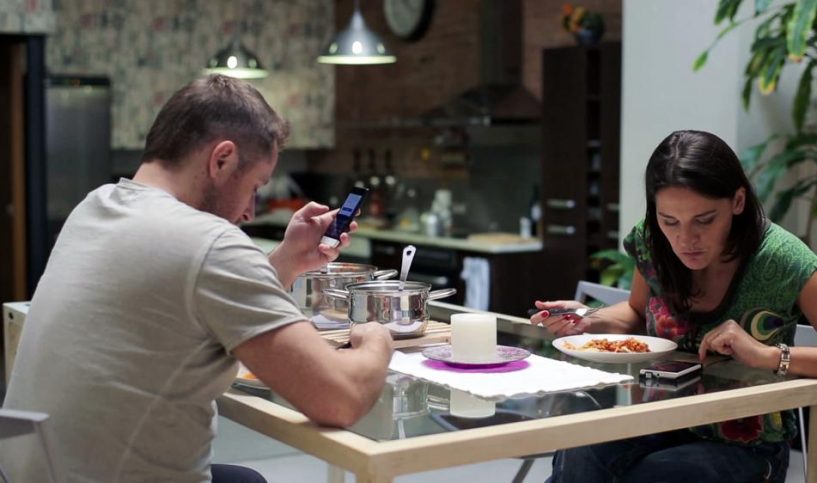This Valentine’s Day, I wonder how many romantic dates will include a beautiful dinner, special effort, interesting conversation…and an intrusive gadget or three.
I was amused to learn a while ago that choosing to interact with a digital device when in the presence of other people is called “phubbing.” Al-Nowair (@al_nowair) had a funny and relevant ad campaign about this practice on Instagram, and I’ve been reminded recently of how social behavior and conventions can be based on myths.
Two related myths are continually quoted, stated, and passed around as truth, when in fact, both have been proven over and over to be false.
Myth #1 – “Multi-tasking” is efficient.
Myth #2 – We have “free time.”
The first is unfeasible, and the second doesn’t exist.
Over and over, studies have shown that multi-tasking, focusing on more than one task/project at a time, is, a) inefficient, b) stress-inducing, and c) in reality, impossible. Our brains can truly only focus on one thought at a time. When we have multiple projects or tasks on the go and are constantly interrupted by other matters or responsibilities, we do things badly or at least less well than we would have if the task had been given our entire attention. The current habit of having devices ringing or whistling while trying to complete paperwork (homework) and being regularly interrupted has actually given rise to higher stress levels, less efficiency, and what psychologists are calling “fractured focus.”
The second myth is more pernicious. The truth is, we don’t have “free time.” No one does. We have discretionary time – that is, periods when we are free to choose how we spend that time, but time is not free. We all get the same amount of time; it passes at the same speed for all of us. We cannot bank it, save it, keep it, or stop it. All we really get to decide is how we spend this moment. If we have committed to attend an event, we must obviously say, “No,” to other events in the same time slot. At this point, we human beings are not able to be in two places at the same time. (Pitiful, but there you have it.) For example, if I am at work, I cannot be with my grandsons.
We have embraced the falsity that “multi-tasking” is using an “iThingy” at one event to keep track of what’s happening at another. When I decide to use my discretionary time to do something with my grandsons (or anyone else) but then spend time on my devices in the same period, I’m actually only half (or less) engaged in any of the moments. Neither one I’m physically in, nor the virtual ones I’m following. Sadly, “fractured focus” is the norm these days.
The answer to both lies is in focusing on being in the moment; present mentally, emotionally, psychologically, in all the ways that matter.
Professionally, find several helpful sources of information on time management, minimizing stress, and maximizing effectiveness. Try out the suggestions and implement some of the strategies that will work for you. Fine-tune your work habits, aiming for the efficient single-minded focus that allows you to accomplish what needs to be done so you can leave work AT work.
Personally, purpose to deliberately focus your undivided attention on the relationship of the moment. Be present. Set aside scheduled chunks of time to build relationship with those who are important to you. Leave the iThingies off or at home and enter into the spirit of the moment. Remind yourself this is not free time, but rather time you have chosen to spend with other people.
I could be wrong, but I think I’d have better relationships, I’d produce a higher quality of work, and I’d have a lower stress level if I consciously countered the effects of these two myths. I would work when I am at work, and I would be present for my grandsons when I am with them.
While it may seem “Old School” this is a reality of being human that cannot quickly be discarded without cost. It takes time and effort to build real relationships, whether personal and professional, and this can only truly be accomplished by focusing on the process, one moment at a time.
If this year I chose to be single-minded, and to rigorously practice being here-and-now, I wonder how different my relationships could be, and what I might have accomplished when I reflect on 2015 next December?








